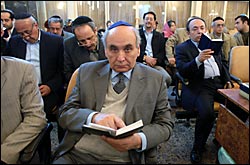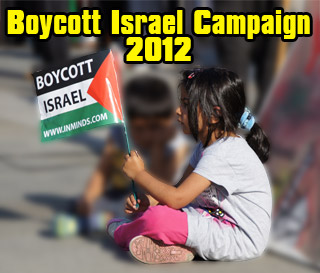
 Innovative Minds © 2014. All Rights Reserved. www.inminds.co.uk |
|
[Iran] Comment: Lets do a little comparison regarding political representation of minorities in Iran and the UK. The constitution of the Islamic Republic guarantees minorities representation in parliament, the number of seats guarenteed depends on their population, so the Jewish community have 1 MP, the Armenian Christians get 2 MPs, the Chaldean and Assyrian Catholic Christians get 1 MP between them and the Zoroastrians get 1 MP in a parliament of 290 MPs. Each minority chooses their own MPs who is there to only represent them. Lets look at the Jewish population in Iran. According to the article there are betwen 25,000 and 30,000 Jews in Iran out of a population of 70,000,000. Lets take the higher figure of 30,000, thats 0.04% of the population. They get 1 MP guarenteed out of a total of 290 MPs. If it was the UK with its parliament of 646 MPs that would equate to 2.2 MPs guarenteed. And remember only Jews get to choose the Jewish MPs - so the elected Jewish MPs really do represent the Jews in parliament. Unlike the UK where MPs only represent the party and constituency they come from - so minorities loose out unless there happens to be an abnormally high concentration of a minority in one constituency like in Bethnal Green. Now lets look at the Muslim minority in the UK - according to the last census they stand at 2.7% of the population - thats 67.5 times greater than the Jewish % of the Iranian population. If you do the maths that equates to 150 Muslims MPs guaranteed in the UK parliament![1] Well we can dream cant we... [1]The UK parliament has 4 Muslim MPs, each in following their partys line has voted for legistation targeted against Muslims. In Ahmadinejad's Iran, Jews still find a spaceScott Peterson, Staff writer of The Christian Science Monitor Some 25,000 Jews still live in Iran and many say that President Mahmoud Ahmadinejad's fiery anti-Israeli rhetoric is about politics, not religion.
There is always [talk] outside the country that religious minorities are under pressure. It is important to say that what people say about minorities is completely wrong, Jews here have great Iranian roots â they love Iran. Personally, I would stay in Iran no matter what. I speak in English, I pray in Hebrew, but my thinking is Persian.
Maurice Motamed, Jewish MP in the Iranian Parliament. Enmity runs deep between arch-foes Iran and Israel. And that confrontation complicates the lives of Iranian Jews, who make up the largest community of Jews in the Middle East outside the Jewish state. Iran's Jews are buffeted by inflammatory rhetoric from President Mahmoud Ahmadinejad about "wiping Israel off the map" and denying the Holocaust, and a politically charged environment that often equates all Jews with Israel and routinely witnesses the burning of the "enemy" flag. But despite what appears to be a dwindling minority under constant threat of persecution, Iranian Jews say they live in relative freedom in the Islamic Republic, remain loyal to the land of their birth, and are striving to separate politics from religion. They caution against comparing Iran's official and visceral opposition to the creation of Israel and Zionism with the regime's acceptance of Jews and Judaism itself. "If you think Judaism and Zionism are one, it is like thinking Islam and the Taliban are the same, and they are not," says Ciamak Moresadegh, chairman of the Tehran Jewish Committee. "We have common problems with Iranian Muslims. If a war were to start, we would also be a target. When a missile lands, it does not ask if you are a Muslim or a Jew. It lands." The continuous Jewish presence in Iran predates Islam by more than a millennium. One wave came when Jews sought to escape Assyrian king Nebuchadnezzar II around 680 BC; others were freed from slavery by Cyrus the Great with the conquest of Babylon some 140 years later. Anti-Semitism historically 'rare'Historically, say Jewish leaders, anti-Semitism here is rare, a fact they say is often lost on critics outside, especially in Israel, where many Iranian Jews have relatives. Still, the Jewish community has thinned by more than two-thirds since Iran's 1979 Islamic revolution, to some 25,000; the largest exodus took place soon after the Islamic Republic was formed, though a modest flow out continues.  A Synagogue amid mosques: A Jewish man at the Yousefabad Synagogue last month in Tehran, Iran. Some 25,000 to 30,000 Jews live relatively freely among the country's majority Shiite Muslims. "Our problem is that the Israel issue is not solved, and that affects us here," says one Iranian Jew who asked not to be named. But that does not affect every Iranian Jew. Surgeon Homayoun Mohaber measures his nationalism in blood, and bits of metal â the kind of support that Iranian Jews say has defined their small community's ties to Iran. During the Iran-Iraq War of the 1980s, as an Iranian military surgeon, Dr. Mohaber conducted more than 900 frontline operations, was himself wounded, and gave blood twice to save fellow Iranian soldiers. Today, in his Tehran clinic, he keeps a jar full of bullets and shrapnel fragments, extracted during the war from wounded soldiers.
The relations between Jews and Muslims, between 70 million Muslims and 30,000 Jews, are very good. In Israel, the situation for Iranian Jews is quite misunderstood. [The Islamic government] made very good respect for me all the time, and did not care about my religion after the revolution.
Dr. Mohaber, Iranian Jewish Surgeon. "The relations between Jews and Muslims, between 70 million Muslims and 30,000 Jews, are very good," says Mohaber. "In Israel, the situation for Iranian Jews is quite misunderstood." "[The Islamic regime] made very good respect for me all the time, and did not care about my religion after the revolution," says Mohaber, who avoided a general purge of Jews from the officer ranks after Iran's 1979 Islamic revolution. But some episodes have shaken those who remain. In 1999, charges of spying for Israel were brought against 13 Jews in Shiraz and Isfahan, sparking a new exodus and widespread fear. Amid a welter of international criticism, 10 of those charged were handed sentences â later shortened â that ranged from four to 13 years in prison. Jews in Tehran at the time told the Monitor of their fears that "Zionist groups connected with the US" were hurting their cause by using the issue against Iran. Today, all 13 are free, and remain living in Iran. "The effect [of the Shiraz cases] was very bad," recalls Mohaber. "But they have rectified it. I think it was a political case between Iran and Israel." Fine line between faith and politicsThe saga underscored the delicate line Iranian Jews draw daily between their religion and politics. Outside Iran, "they think our condition is very bad, living as a minority in a religious country, with law based on Islamic law," says Mr. Moresadegh, of the Jewish Committee. He notes "some difficulties," including restrictions on government employment, but says that Mr. Ahmadinejad's questioning of the Holocaust, while very unwelcome, "has no effect on our daily life." The president's fierce anti-Zionist speeches culminated with Iran hosting a controversial Holocaust conference last December.
If you think Judaism and Zionism are one, it is like thinking Islam and the Taliban are the same, and they are not.
Ciamak Moresadegh, chairman of the Tehran Jewish Committee "It is quite clear that a bunch of Zionist racists are the problem the modern world is facing today," the president said in his Iranian New Year message on March 21. They aim "to keep the world in a state of hardship, poverty, and grudge and strengthen their rule. The great nation of Iran is opposed to this inhuman trend." The Iranian Foreign Ministry recently facilitated a day-long visit to significant Jewish sites in Tehran for the diplomatic corps. Privately, Iranian officials said the event was designed to reassure Iranian Jews, after unease over the December conference. Jewish leaders portrayed themselves as ordinary Iranians, facing the same problems and with the same aspirations for their nation. "The Jewish community was probably one of the first [minority groups] to join in with the revolution, and in this way gave many martyrs," Maurice Motamed, holder of the one seat set aside for Jews in Iran's 290-seat parliament, told the diplomats. "And after that, during the eight years of the imposed [Iran-Iraq] war, there were many martyrs and disabled given to Iranian society." "Every revolution is followed by some issues, problems, and restrictions [on minorities]," said Mr. Motamed. "Fortunately, all these effects have been completely removed in the last ten years." The diplomatic tour â with a number of Foreign Affairs Ministry officials â visited a Jewish school, a home for the elderly, a community center, and one of 100 synagogues left from Iran, during Friday Sabbath prayers.
Dr. Sapir Hospital, a Jewish charity hospital:
"We have obviously had migration out of Iran," says Afshin Seleh, a teacher of Jewish heritage with a white yarmulke skullcap, who says he loses two to three students per year in classes of up to 30. Upon the walls of the Jewish school are portraits of revolution leader Ayatollah Ruhollah Khomeini, and Iran's current supreme religious leader. "There have been different voices [coming] from the government, so people felt unsafe," says Mr. Seleh. "But our existence here has always been separate from politics in Iran, and we always had peaceful coexistence with the Muslim community." Part of that coexistence has been gratitude for the Dr. Sapir Hospital, a Jewish charity hospital that would have closed years ago, but for subsidies from Jews inside and outside Iran, doctors say. During the 1979 revolution, the hospital refused to hand over those wounded in clashes with the security forces of the pro-West Shah Reza Pahlavi. Ayatollah Khomeini later sent a personal representative to express his thanks. Ahmadinejad, too, has made a $27,000 donation. Still, the Iran-Israel standoff has spilled over into many avenues of life here, with varied results for Iranian Jews. Strong anti-Zionist undercurrents developed in Iran â and across the Middle East â since Israel's creation in 1948. Those views came to a boil in Tehran after the 1967 war, when Israel crushed Arab foes and occupied the West Bank, Gaza, and Sinai. That war marked a turning point in Iranians' attitudes toward the Jewish state, and sometimes toward Iranian Jews. During the Asian Cup final in 1968 (which Iran won, 2-1) Iranian fans wore eye patches and chanted abusive slogans, to mock the Israeli defense chief Moshe Dayan. According to published reminiscences, "some homes of Jews in Tehran were attacked and set on fire." In a match-up between Iran and Israel in the final of the 1974 Asian Games in Tehran, protesters against Israel, members of then-shadowy Islamic groups, prepared to attack the Israeli soccer team. "Our aim and dream," recalls Ezat Shahi, identified as a "revolutionary fighter" in recently published memoirs, "was to create an event similar to the 1972 Munich Olympics, when the Israeli team was taken hostage by Palestinian gunmen from "Black September," in a standoff that left 11 Israeli athletes dead. Security measures forced protesters to scale back those plans, but rioting broke out that night. "On that night, [the authorities] couldnât prevent people from doing what they wanted," says a witness who asked not to be named. "As soon as Israel expanded its power [in the 1967 war] and oppressed the Palestinians, even the liberal part of Iranian society started to call them Zionists." Those flames, encouraged by Islamist groups that would play a key role in the 1979 revolution, helped define the Islamic Republic's opposition to Israel â but not necessarily to Iranian Jews. "There is always [talk] outside the country that religious minorities are under pressure," says Mr. Motamed. "It is important to say that what people say about minorities is completely wrong," "Jews here have great Iranian roots â they love Iran," says chairman Moresadegh. "Personally, I would stay in Iran no matter what. I speak in English, I pray in Hebrew, but my thinking is Persian." Source: http://www.csmonitor.com/2007/0427/p01s03-wome.html?page=1 Also Of InterestPage URL: http://inminds.com/article.php?id=10058
|
|
Support Us
If you agree with our work then please support us.Campaigns INMINDS Facebook Live Feed Latest Video's
INMINDS Twitter Feed Tweets by @InmindsComFeatured Video's
You need Flash player 8+ and JavaScript enabled to view this video.
[all videos (over 200)..] Featured MP3 Podcast  "[Deportation at the airport] We saw the injured [Turkish] men going through.. a lot had a leg cut out of their trousers or an arm cut out of their top. It had been cut out to treat their wounds.. they were covered in blood, blood that had been there for three days, and some of them had wounds that were still bleeding.. What upset me most was seeing the dozen men, one after another, hobbling across the terminal, with a bandaged foot. I couldn't ask them why so many of them had a bandaged foot, I couldn't ask them what had happened, because if they spoke or if any of us spoke to them the Israelis beat the injured person.. We later found out that they had these injuries on the tops of their feet from when the troops came down from the helicopter on the Mavi Marmara, and they came down firing - they had been shot from above. Some of the men that were killed were shot at close range - head and chest, but a dozen of the men who were shot, among 59 people who were shot, they were shot at the tops of their feet - the bullets were coming down.. They weren't given a wheelchair or a pair of crutches, and if any of the other passengers stood up and tried to offer [help].. that person was dragged away and smacked by these Israelis. The Israeli soldiers sat on the floor, laughed and sniggered and made every one of these Turkish men hobble and hop all the way across, some 200 metres, everyone of them, one by one, made to do that purely for the sick amusement of the Israeli soldiers." Survivor of the flotilla massacre speaks candidly of her experience Ratstar Centre London, 22 July 2010 [46min / 42Mb] [all podcasts..] Newsletter Feedback |
 |
 |












































